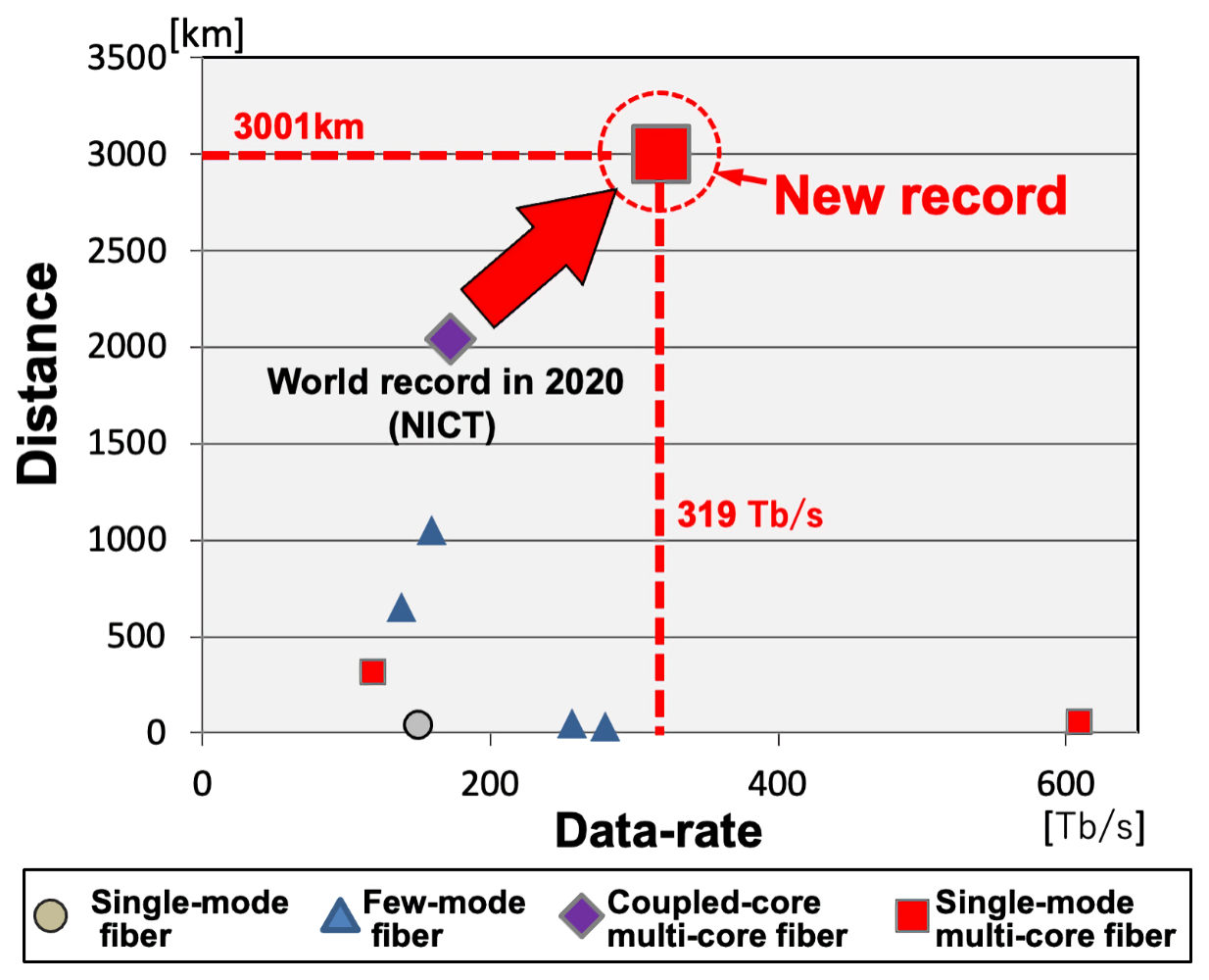New World Record as Fibre Optic Speeds Pushed to 319Tbps

Scientists in Japan have just shattered last year’s world record for the fastest fibre optic internet data transfer speed by using a four core fibre cable to transmit data at 319Tbps (Terabits per second) over a whopping distance of 3001km, which compares with the previous record (here) of 178Tbps over 40km in London UK.
The team used an existing 4-core fibre cable for their test, albeit with the very latest in amplification technologies (some doped in rare earth elements like thulium and others in erbium), as well as Distributed Raman Amplification (DRA), and across three signal bands (S, C and L).
After that a 552-channel comb laser was then used to send the signal across the various wavelengths and down the fibre (i.e. 552 PDM-16QAM, wavelength-division multiplexed [WDM] channels). The cable itself had the same cladding diameter (125 µm) as standard single-core optical fibre, which ensures some compatibility with conventional cabling infrastructure and reduces concerns over the mechanical reliability of larger fibres.
Advertisement
In order to boost the signal, the aforementioned amplifiers were deployed at intervals of 69.8km along the cable.

The team, which are based at the National Research and Development Agency (NICT) in Japan, plan to continue their development of wide-band, long-distance transmission systems, with the aim of achieving further improvements in transmission speed and range.
As we always say, you’re unlikely to see this sort of speed being delivered to homes anytime even remotely soon, but it is the sort of work that could be harnessed in the future to boost the performance of longer international (e.g. subsea) and national fibre routes. The ability to carry more data down existing cables also tends to result in cheaper capacity from suppliers, which ultimately benefits broadband ISPs and their customers too.
Advertisement
Mark is a professional technology writer, IT consultant and computer engineer from Dorset (England), he also founded ISPreview in 1999 and enjoys analysing the latest telecoms and broadband developments. Find me on X (Twitter), Mastodon, Facebook, BlueSky, Threads.net and Linkedin.
« Virgin Mobile UK Moves to Scrap Pay As You Go Packages UPDATE
Virgin Media O2 Extend 1Gbps FTTP to 4,200 Homes in Dalkeith »





















































The London test you mentioned was in a single fibre, though.
Impressive data rates for sure!
yeah this is the thing, i’ll wager if the UK test had used 4 cores instead of 1 they could well have exceeded this record, but the distance is vastly different too, it’s not really a comparable test. But we should maybe set a standard length for tests then we can compare apples to apples.
“you’re unlikely to see this sort of speed being delivered to homes anytime even remotely soon”
300Tb/s? Pah, I only wish I could get those speeds here. I can only achieve 300meg here in rural Wales. Can barely use the telly with that! When will Virgin sort their act out??
/S
Gigabit will be available in my area soon, they’re pulling the fibres right now. I may end up getting gigabit because I want the 200mbit upload speed. I’d be much happier with a cheaper 200/200 though as that would be perfect.
Ha, good luck! Openreach vans are everywhere right now.
I think 10meg makes internet viable. 40 is comfortable. Anything North of 200meg is luxury!
“I’d be much happier with a cheaper 200/200 though as that would be perfect”
Agreed, though some regular posters here on ISPReview claim there is no need for symmetric fibre. Good upload speeds are essentials for certain types of applications and businesses, broadband is not always about down-streaming services only.
Only 300 – poor you!
Max 25/4 here and now in the rural up to 2026 so not changing anytime soon. Luckily only 4 people needing to WFH/Xbox download/Stream everything.
Ryan, I was being sarky!!!
Beam me up Scotty, getting on a jet plane will be a thing of the past, once they have mustered the little thing of teleportation, we are going to need all the bandwidth we can lay our hands on.
If only they’d used hollow fibres.
Yes
BT is trailing it at the moment
Who cares if they are sending it 3000km if they need amplifiers every 70km.
I only care about numbers where amps are not used.
The transatlantic cables are anywhere from around 7000km to 13,000km. Having 100+ amps on that is just another large points of potential failure.
Rather bigger problem than the points of failure would be the provision of power to the amplifiers.
Whether this is intentional trolling or being poorly informed it’s not funny either way which kinda makes it lose the impact.
Gary – the power is delivered over copper incorporated into the transatlantic cable. One custom made cable, optics and power in one.
Bib, transatlantic cables have amplifiers. Any optic link over a significant distance has amplifiers.
truly mind-blowing numbers, and like many have already said. As the global demand for data grows, we will see the transatlantic cable getting to their maximum utilization so this is a good way to get more out of the same cable.
One thing I can’t get my head around:
– Sure the cable can handle that speed, but what is the equipment to measure the speed, I.E there is nothing on planet earth which can write that fast to a disk or even computer memory, unless I have missed my math somewhere!? So my question is how the hell did they manage to measure the speed?
Thanks
That capacity was the sum of 552 wavelengths. It would’ve been measured at the transmission equipment either side.
Each wavelength was carrying less than 600 Gbit/s as a 16-QAM modulated carrier.
A swift Google points to http://www.nict.go.jp/en/press/2021/07/12-1.html which carries more information.
The throughput is the sum of the line rate of each wavelength. It can be calculated rather than measured because the speeds that get summed are not variable.
Using an analogy – if I buy and strap together a thousand two litre bottles, I don’t need to fill them and empty them to know the total capacity.